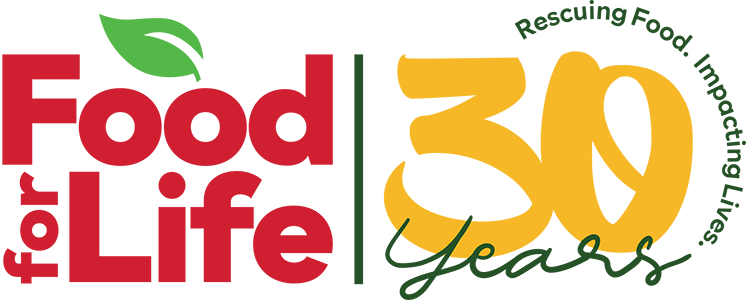Giving monthly is a convenient way to nourish neighbours throughout the year. And all monthly gifts will be matched for 2x the impact! Learn more.
On any given day, you never know what you’ll find at our community kitchen at the Connect Centre, located at Milton Bible Church. On this day, it’s a lot of organic kale — dozens of clear garbage bags full, picked up from a farm donor by one of our drivers.
Most of this kale will be washed, trimmed, and frozen to be used during colder months when we get fewer deliveries of fresh produce. A quarter will be bagged for distribution at the Milton Bible Church community program. The rest might end up in Food for Life’s good food bags or used as an ingredient for the Good Soup Project.
“This kale is going to take over my life right now!” says Chef Melani Bastians, laughing about how creative and adaptable she must be when large donations like this one come in. “You never know what you’re going to get!”
Food for Life programs are dependent on community spaces to prepare, store, and serve good nutritious food. You’ll find us in churches, apartment building foyers, seniors residences, and recently, with COVID-19 protocol in place, in parking lots, hosting drive-through neighbourhood and community programs.
Accessibility is at the forefront of everything we do at Food for Life. That’s why it’s important to us to ensure that our programs and services are offered in spaces near transit hubs or available parking spots. This is especially true in northern Halton where fewer community spaces exist.
“Our model is we work with community partners, and a lot of times that means churches. It’s not because we’re a faith-based organization. It goes back to the idea that churches are in neighbourhoods and people can walk to their church. Churches also have the space, the parking, and the people.”
Donna Slater
“Our model is we work with community partners, and a lot of times that means churches. It’s not because we’re a faith-based organization. It goes back to the idea that churches are in neighbourhoods and people can walk to their church,” she says. “Churches also have the space, the parking, and the people,” she says, adding that Food for Life volunteers often come from faith-based organizations.
Food for Life’s community kitchen at the Connect Centre opened in July 2020. With thanks to the Community Foundation of Halton North, Chef Melani is there to turn rescued food that would otherwise be destined for the landfill into hearty, nutritious, ready-to-eat meals. It’s a vibrant hub that’s providing neighbours with food they can enjoy all over Halton.
To learn about our amazing community partners and spaces, visit the Community Programs section of our website.
Get news from Food For Life delivered right to your inbox and never miss an update.
Food for Life Canada Office
2258 Mountainside Drive
Burlington, ON L7P 1B7
905-635-1106
